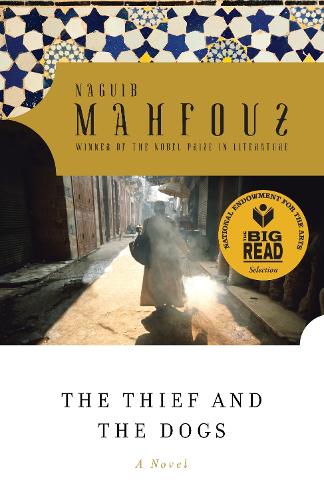
The Thief and the Dogs
(Paperback)
Publishing Details
The Thief and the Dogs
By (Author) Naguib Mahfouz
Bantam Doubleday Dell Publishing Group Inc
Bantam Doubleday Dell Publishing Group
20th September 1989
20th September 1989
United States
Classifications
General
Fiction
892.736
Physical Properties
Paperback
160
Width 131mm, Height 202mm, Spine 11mm
130g
Description
Naguib Mahfouz's haunting novella of post-revolutionary Egypt combines a vivid pychological portrait of an anguished man with the suspense and rapid pace of a detective story.
After four years in prison, the skilled young thief Said Mahran emerges bent on revenge. He finds a world that has changed in more ways than one. Egypt has undergone a revolution and, on a more personal level, his beloved wife and his trusted henchman, who conspired to betray him to the police, are now married to each other and are keeping his six-year-old daughter from him. But in the most bitter betrayal, his mentor, Rauf Ilwan, once a firebrand revolutionary who convinced Said that stealing from the rich in a unjust society is an act of justice, is now himself a rich man, a respected newspaper editor who wants nothing to do with the disgraced Said. As Said's wild attempts to achieve his idea of justice badly misfire, he becomes a hunted man so driven by hatred that he can only recognize too late his last chance at redemption.
Reviews
"The incredible variety of Mahfouz's writing continues to dazzle our eyes." --The Washington Post
"[Naguib Mahfouz] is not only a Hugo and a Dickens, but also a Galsworthy, a Mann, a Zola, and a Jules Romains." --Edward Said, The London Review of Books
"The greatest writer in one of the most widely understood languages in the world, a storyteller of the first order in any idiom." --Vanity Fair
"A Dickens of the Cairo cafes." --Newsweek
"Naguib Mahfouz virtually invented the novel as an Arab form. He excels at fusing deep emotion and soap opera." --The New York Times Book Review
"Mahfouz's work is freshly nuanced and hauntingly lyrical.The Nobel Prize acknowledges the universal significance of his fiction." --Los Angeles Times Book Review
Author Bio
Naguib Mahfouz was born in Cairo in 1911 and began writing when he was seventeen. His nearly forty novels and hundreds of short stories range from re-imaginings of ancient myths to subtle commentaries on contemporary Egyptian politics and culture. Of his many works, most famous is The Cairo Trilogy, consisting of Palace Walk (1956), Palace of Desire (1957), and Sugar Street (1957), which focuses on a Cairo family through three generations, from 1917 until 1952. In 1988, he was the first writer in Arabic to be awarded the Nobel Prize in Literature. He died in August 2006.
